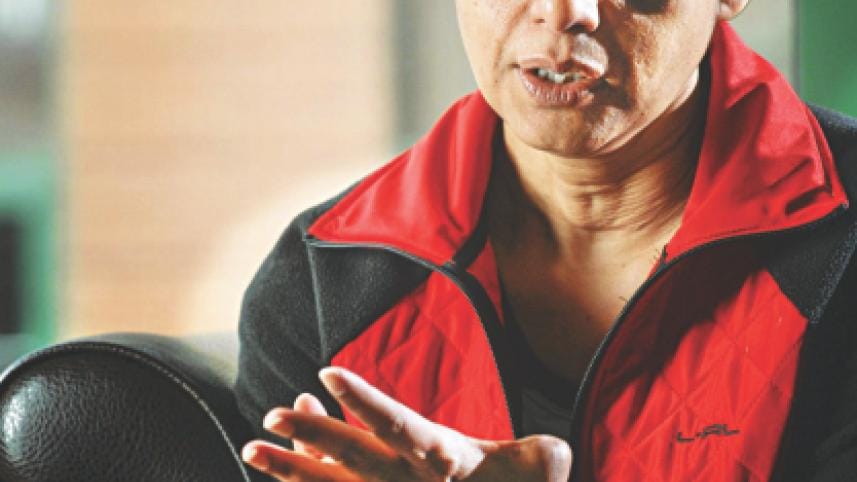Avijit's wife lashes out at govt

On a recent evening in a Midwestern US city, a middle-aged woman with bandaged arms and a missing thumb entered a crowded restaurant. Nearby, children coloured with crayons. Waiters rushed by.
The maimed woman, Rafida Ahmed Bonya, scanned the room nervously. The Atlanta financial executive has been hiding since Islamic militants wielding machetes attacked her on February 26 in her native Bangladesh.
During the assault, her husband -- the Bangladeshi-American secular activist and blogger Avijit Roy -- was hacked to death. Bonya sustained four head wounds, and her left thumb was sliced off.
On May 3, the Indian-born head of al-Qaeda in the Indian Subcontinent reportedly claimed responsibility for the attacks on Avijit and others in Bangladesh and Pakistan.
In her first extensive interview since the attack, Bonya criticised the Bangladeshi government for not responding more aggressively to her husband's slaying.
“This was well planned, choreographed -- a global act of terrorism,” she said. “But what almost bothers me more is that no one from the Bangladesh government has reached out to me. It's as if I don't exist, and they are afraid of the extremists. Is Bangladesh going to be the next Pakistan or Afghanistan?”
'WALKING A FINE LINE'
In an interview, Sajeeb Wazed Joy, the son of Prime Minister Sheikh Hasina, said his mother offered private condolences to Roy's father. But the political situation in Bangladesh is too volatile for her to comment publicly, he said. Avijit was an avowed atheist; the book he was promoting when he was killed is titled “The Virus of Faith.”
“We are walking a fine line here,” said Joy, also the prime minister's ICT affairs adviser. “We don't want to be seen as atheists. It doesn't change our core beliefs. We believe in secularism,” he said. “But given that our opposition party plays that religion card against us relentlessly, we can't come out strongly for him. It's about perception, not about reality.”
A spokesman at the Bangladesh embassy in Washington said he did not know why no one from his government had yet to contact Bonya, who, like her late husband, is a dual Bangladeshi-US citizen.
Joy said Avijit's death came during a three-month period when 160 people died in bus bombings in Dhaka, and shortly before explosions near the prime minister's motorcade. Joy blamed political opponents who, he said, seek to destabilize his mother's government.
“To us, Avijit Roy is no different than the 160 others that have been killed,” he said. “We want to bring all the killers to justice. I understand why [his wife] is upset. My mother has been targeted by these same fundamentalists."
FREE THINKER
Well known in his native Bangladesh, Avijit was largely anonymous in his suburban Atlanta neighbourhood, where the couple lived since 2006.
By day, he worked as a Verizon software engineer. At night, he was a prolific writer, emerging as a leading critic of religious extremism in Bangladesh.
To some, he was a provocative atheist, but his blog also reflected a strong belief in the value of civil debate, said his stepdaughter, Trisha Ahmed, 18.
A THREAT
In 2002, while in Singapore, Avijit noticed a blog post from a US woman who wrote of religion, “I don't understand how people can believe in fairy tales.” It was Bonya, who would become his wife.
“A lot of people attacked me online for that post,” she recalled. “I was a tech manager in Atlanta at the time, a single mom. I was intimidated and didn't respond. The next day, someone named Avijit Roy is defending me.”
They dated long distance for years, and he reluctantly moved from Singapore to Atlanta in 2006: Bonya would not leave the United States until her daughter completed high school. Avijit held a doctorate in biomedical research, but found it easier to get a lucrative job and a US visa as a software architect, his wife said.
After Trisha Ahmed was in college, the couple, by then married and US citizens, decided to visit Dhaka. The two departed in mid-February.
“We knew that anything can happen in a country like that, and we took precautions,” Ahmed said. “There was only one threat against him but we didn't take it seriously. Otherwise, we wouldn't have gone.”
 For all latest news, follow The Daily Star's Google News channel.
For all latest news, follow The Daily Star's Google News channel.
Comments